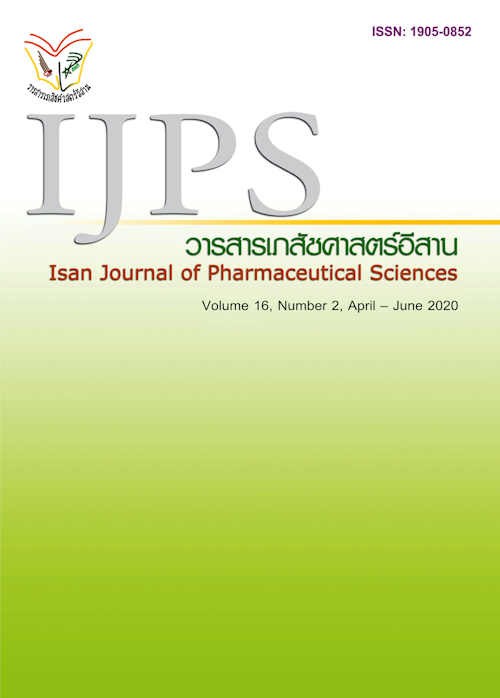Utilization of Anti-Secretory Drugs for Stress Ulcer Prophylaxis in General Internal Medicine Wards
Main Article Content
Abstract
Recent studies have shown that stress ulcer prophylaxis (SUP) is overutilized in inpatient medicine wards. Objective: To evaluate the utilization of antisecretory-drugs for SUP in general internal medicine services during hospital stay or at hospital discharge. Materials and Method: This study was a retrospective chart review of adult internal medicine patients admitted in hospital over a 1-year period. The number of patients receiving antisecretory drugs for SUP with the indications suggested by the American Society of Health-System Pharmacists (ASHP) guidelines were assessed. Results: Of the 200 patients who met inclusion criteria, 97 (48.5%) patients were prescribed antisecretory-drugs for SUP appropriately based on the guideline. A total of 103 patients received antisecretory-drugs without any indication. Of these, 52 patients (50.5%) continued antisecretory-drugs upon discharge. Conclusion: SUP was utilized inappropriately in patients admitted in general internal medicine wards. Moreover, antisecretory-drugs were frequently continued upon discharge without the indication. The overutilization of these medications may contribute increased risks of significant side effects and increased healthcare costs.
Article Details
In the case that some parts are used by others The author must Confirm that obtaining permission to use some of the original authors. And must attach evidence That the permission has been included
References
Alhazzani W, Alenezi F, Jaeschke RZ, Moayyedi P, Cook DJ. Proton pump inhibitors versus histamine 2 receptor antagonists for stress ulcer prophylaxis in critically ill patients: a systematic review and meta-analysis. Crit Care Med. 2013;41(3):693-705.
ASHP Therapeutic Guidelines on Stress Ulcer Prophylaxis. ASHP Commission on Therapeutics and approved by the ASHP Board of Directors on November 14, 1998. Am J Health Syst Pharm. 1999;56(4):347.
Barletta JF, El-Ibiary SY, Davis LE, Nguyen B, Raney CR. Proton Pump Inhibitors and the Risk for Hospital-Acquired Clostridium difficile Infection. Mayo Clin Proc. 2013;88(10):1085-90.
Belfield KD, Kuyumjian AG, Teran R, Amadi M, Blatt M, Bicking K. Impact of A Collaborative Strategy to Reduce the Inappropriate Use of Acid Suppressive Therapy in NonIntensive Care Unit Patients. Ann Pharmacother. 2017;51(7):577-83.
Bez C, Perrottet N, Zingg T, Leung Ki EL, Demartines N, Pannatier A. Stress ulcer prophylaxis in non-critically ill patients: a prospective evaluation of current practice in a general surgery department. J Eval Clin Pract. 2013;19(2):374-8.
Buckley MS, Park AS, Anderson CS, et al. Impact of a clinical pharmacist stress ulcer prophylaxis management program on inappropriate use in hospitalized patients. Am J Med. 2015 Aug;128(8):905-13.
Buendgens L, Koch A, Tacke F. Prevention of stress-related ulcer bleeding at the intensive care unit: Risks and benefits of stress ulcer prophylaxis. World J Crit Care Med. 2016;5(1):57-64.
Chumnumwat S, Dilokpatanamongkol P, Wiriyanont T, Sricholwattana T, Lekpittaya N, Sa-ngasoongsong P, Sumritpradit P. Compliance with Guidelines for Stress Ulcer Prophylaxis in Surgical and Orthopedic Units at Ramathibodi Hospital. J Med Assoc Thai 2018; 101 (1): 58-62.
Cook DJ, Fuller HD, Guyatt GH, Marshall JC, Leasa D, Hall R, et al. Risk factors for gastrointestinal bleeding in critically ill patients. Canadian Critical Care Trials Group. N Engl J Med. 1994;330(6):377-81.
Cook DJ, Griffith LE, Walter SD, Guyatt GH, Meade MO, Heyland DK, et al. The attributable mortality and length of intensive care unit stay of clinically important gastrointestinal bleeding in critically ill patients. Crit Care. 2001;5(6):368-75.
Dial S, Delaney JA, Barkun AN, Suissa S. Use of gastric acid-suppressive agents and the risk of community-acquired Clostridium difficile-associated disease. JAMA. 2005;294(23):298995.
Faisy C, Guerot E, Diehl JL, Iftimovici E, Fagon JY. Clinically significant gastrointestinal bleeding in critically ill patients with and without stress-ulcer prophylaxis. Intensive Care Med. 2003;29(8):1306–13.
Flurie RW, Gonzales JP, Tata AL, et al. Hospital delirium treatment: continuation of antipsychotic therapy from the intensive care unit to discharge. Am J Health Syst Pharm. 2015;72(23 suppl 3):S133-39.
Heidelbaugh JJ, Inadomi JM. Magnitude and economic impact of inappropriate use of stress ulcer prophylaxis in non-ICU hospitalized patients. Am J Gastroenterol. 2006;101(10):2200-5.
Herzig SJ, Howell MD, Ngo LH, Marcantonio ER. Acid-suppressive medication use and the risk for hospital-acquired pneumonia. JAMA. 2009;301(20):2120-8.
Herzig SJ, Vaughn BP, Howell MD, Ngo LH, Marcantonio ER. Acid-suppressive medication use and the risk for nosocomial gastrointestinal tract bleeding. Arch Intern Med. 2011;171(11):991-7.
Hong MT, Monye LC, Seifert CF. Acid Suppressive Therapy for Stress Ulcer Prophylaxis in Noncritically Ill Patients. Ann Pharmacother. 2015 Sep;49(9):1004-8.
Laheij RJ, Sturkenboom MC, Hassing RJ, Dieleman J, Stricker BH, Jansen JB. Risk of community-acquired pneumonia and use of gastric acid-suppressive drugs. JAMA. 2004;292(16):1955-60.
Lazarus B, Chen Y, Wilson FP, Sang Y, Chang AR, Coresh J, et al. Proton Pump Inhibitor Use and Risk of Chronic Kidney Disease. JAMA Intern Med. 2016;176(2):238-46.
Liberman JD, Whelan CT. Brief report: Reducing inappropriate usage of stress ulcer prophylaxis among internal medicine residents. A practice-based educational intervention. J Gen Intern Med. 2006; 21: 498-500.
Nardino RJ, Vender RJ, Herbert PN. Overuse of acid-suppressive therapy in hospitalized patients. Am J Gastroenterol. 2000;95(11):3118-22.
Plummer MP, Blaser AR, Deane AM. Stress ulceration: prevalence, pathology and association with adverse outcomes. Crit Care. 2014;18(2):213.
Qadeer, M. A., Richter, J. E. & Brotman, D. J. Hospitalacquired gastrointestinal bleeding outside the critical care unit: risk factors, role of acid suppression, and endoscopy findings. J Hosp Med. 2006 Jan;1(1):13-20.
Sheikh-Taha M, Alaeddine S, Nassif J. Use of acid suppressive therapy in hospitalized non-critically ill patients. World J Gastrointest Pharmacol Ther. 2012; 3(6):93-6.
Shin S. Evaluation of costs accrued through inadvertent continuation of hospital initiated proton pump inhibitor therapy for stress ulcer prophylaxis beyond hospital discharge: a retrospective chart review. Ther Clin Risk Manag. 2015; 11:649-57.
Wohlt PD, Hansen LA, Fish JT. Inappropriate continuation of stress ulcer prophylactic therapy after discharge. Ann Pharmacother. 2007;41:1611–16.
Zink DA, Pohlman M, Barnes M, Cannon ME. Long-term use of acid suppression started inappropriately during hospitalization. Aliment Pharmacol Ther. 2005;21(10):1203-9.


